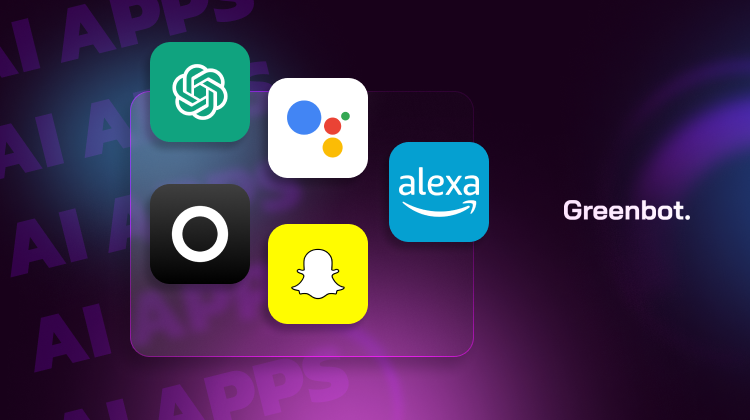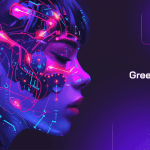
Have you noticed how artificial intelligence (AI) applications quietly become part of your daily life?
AI is transforming personal and professional spaces. The technology is creating everything from virtual assistants to personalized recommendations.
Below, you’ll discover how AI applications are used in various tasks, including language translation, image recognition, and decision-making.
What Are AI Applications?
Artificial intelligence (AI) is a technology that imitates human thinking and behavior. AI apps use machine learning and deep learning to analyze data, find and identify patterns within it, and make decisions. These applications are widely applied across industries. They automate tasks, streamline operations, and improve decision-making.
A study by Shang et al. (2024) shows that AI reduces environmental impacts for businesses. The research found that AI helps lower pollution through technological innovations. It also reduces emissions by automating labor processes. This shows that AI addresses more than just operational challenges. It also plays a crucial role in tackling global issues, such as sustainability.
Another AAAI study found that AI is key to solving global challenges, such as sustainable development and security. AI’s ability to process large amounts of data also supports innovation.
Key Areas Where AI Is Applied
AI is common in these sectors:
AI in Healthcare
AI is transforming healthcare by improving diagnostic tools. It helps create personalized treatment plans and streamlines administrative tasks. Its machine-learning algorithms also help doctors identify diseases by analyzing medical images. This ensures customized treatment based on individual patient data.
AI also automates routine tasks such as scheduling and billing, allowing healthcare workers to focus on patient care.
AI in Finance
In finance, AI is key for fraud detection, trading, and banking. AI algorithms monitor transactions for suspicious patterns, helping prevent fraud in real time. In investment, AI-powered trading systems analyze large datasets to make quick decisions. These informed choices are made faster than what humans might be able to handle.
AI also improves personalized banking by offering tailored financial advice. This is based on individual spending habits and future financial goals. AI chatbots also provide 24/7 customer support.
AI in Education
AI is transforming education by offering personalized learning and automating administrative tasks. Adaptive learning platforms use AI to tailor lessons for each student, helping them improve at their own pace.
AI is also designed to automate administrative tasks like grading and scheduling. This ensures education is more efficient and accessible for both students and teachers.
AI in Transportation
We aren’t just talking about Google Maps. AI is reshaping transportation with self-driving cars and advanced route optimization. Self-driving vehicles use sensors and AI to navigate traffic and their surroundings. This technology has the potential to reduce accidents and ease traffic congestion.
AI-powered route optimization also helps logistics companies plan more efficient delivery routes. This saves time and fuel and ensures more efficient and eco-friendly transport.
AI in Entertainment and Media
AI shapes content curation, search, media production, and targeted advertising. Streaming services like Netflix and Spotify use AI to analyze user behavior. This helps them recommend personalized content to their users, thus improving their experience.
In media production, generative AI aids in scriptwriting and video editing. Analyzing user data, speeds up creativity and improves ads.
Other Fields Utilizing AI
- Agriculture: AI is transforming agriculture by helping farmers monitor crop health. It also optimizes resources like water and fertilizers, making farming more efficient. AI-powered drones and sensors gather field data, allowing for better crop management. This helps increase yields and makes farming more sustainable.
- Retail: In retail, AI analyzes customer behavior to offer personalized shopping experiences. It also helps manage inventory by predicting demand and optimizing stock levels. AI recommendation engines suggest products based on browsing and purchase history, boosting customer satisfaction and increasing sales.
- Logistics: AI improves logistics by using predictive analytics and route optimization. It analyzes traffic, weather, and historical data to plan efficient delivery routes. AI helps with warehouse management by predicting inventory needs. It also automates order fulfillment, improving efficiency.
- Customer Service: AI chatbots provide 24/7 customer support. They use NLP to understand and respond to inquiries, reducing wait times and improving the customer experience. Similarly, AI is transforming human resources with automated resume screening and candidate assessments.
- Manufacturing: In manufacturing, AI-powered robots improve production line efficiency. They perform repetitive tasks with precision, reducing the chance of human error. AI also helps with predictive maintenance by identifying potential equipment issues. This reduces downtime and improves productivity, leading to cost savings for manufacturers.
AI in NSFW Applications
AI has entered the realm of (Not Safe for Work) NSFW AI apps and sexting AI apps, which create personalized adult content and simulate real-time conversations. These apps use AI to generate explicit visual messages based on user preferences, raising concerns about ethics, privacy, and regulation.
While they provide a customized experience, the lack of oversight in this area highlights the potential risks associated with AI in creating sensitive or harmful content.
Why Is AI Used?
AI is widely used to improve efficiency, reduce costs, and drive innovation. Automating tasks helps businesses complete processes faster and with fewer mistakes.
AI also goes beyond human limitations. It tirelessly manages tasks that are too complex or risky for people. In essence, AI can solve many real-world problems.
Most Impactful AI Technologies
Machine Learning Models
Machine learning helps computers learn from data without specific programming. It allows systems to recognize patterns, make predictions, and improve over time. Paired with computer vision, it enables systems to interpret visual data.
This enhances tasks like image and facial recognition and object detection. In finance, it helps with fraud detection and algorithmic trading. These models process large datasets efficiently, aiding decision-making.
In healthcare, machine learning is transforming diagnostics and personalized medicine. It analyzes medical images, predicts outbreaks, and creates tailored treatment plans. This boosts accuracy, reduces errors, and speeds up decisions.
Natural Language Processing (NLP)
Natural Language Processing (NLP) allows computers to understand and generate human language. It powers virtual assistants, chatbots, and language translation tools, making machine interactions feel more natural.
For example, in customer service, NLP chatbots answer user questions quickly and accurately, reducing the need for human involvement and improving efficiency. In healthcare, NLP helps extract valuable insights from medical records and research.
NLP also enables AI to mimic human conversations, which is key in applications like AI girlfriends—virtual companions designed to simulate romantic interactions. These AI girlfriends use NLP to engage in detailed, personalized conversations, often forming emotional connections with users through text.
They can adapt to user preferences, create a sense of companionship, and maintain ongoing dialogues, mimicking romantic relationships.
While this technology enhances the appeal of such apps by making conversations feel real, it also raises ethical concerns, particularly around emotional dependency, data privacy, and the boundaries of AI in human relationships.
Robotics and Automation
AI is critical to robotics and automation, especially in manufacturing and services. AI-powered robots handle repetitive or hazardous tasks with accuracy. In manufacturing, robots assist with tasks like assembly, packaging, and quality control, speeding up production and helping reduce errors.
In service industries, AI automation is changing how businesses operate. Robots assist in cleaning, deliveries, and providing information in retail environments. These AI-driven solutions improve efficiency, reduce costs, and enhance service quality.
Data Analysis
AI-powered data analysis helps users process and understand massive data sets. Machine learning algorithms identify trends, make predictions, and provide actionable insights.
In healthcare, AI helps doctors analyze data and predict outcomes. In marketing, companies use AI to study consumer behavior and improve targeting. It also optimizes campaigns, enhancing accuracy and speeding up processes.
Challenges in AI Applications
Ethical and Privacy Issues
AI brings significant ethical concerns, particularly around data privacy and job loss. AI systems rely on large amounts of data, which can lead to privacy breaches if not managed carefully. For instance, AI surveillance systems can invade privacy by tracking sensitive data. Using AI in healthcare and criminal justice raises ethical concerns.
Fairness and transparency are critical in those fields. As AI grows, addressing its ethical challenges will become more crucial. Another issue is job displacement, as AI takes over tasks previously done by humans. This raises concerns about unemployment in some industries.
There needs to be a balance between technological progress and maintaining ethical standards. This is especially important in areas where human rights are at stake. Strategies to retrain workers are needed to solve this. This will help reduce the harm from AI automation.
Technological Limitations
Despite its capabilities, AI still has technological limitations. One key issue is its need for creativity and context understanding. AI can process a lot of data, but it struggles with tasks that need human intuition or creativity.
This limits its ability to replace humans in jobs that require complex reasoning or emotional skills. Addressing these gaps will be critical to unlocking its full potential as AI evolves.
Top AI Apps
ChatGPT, developed by OpenAI, is a language model that generates human-like text responses. It understands and responds to queries, making it ideal for numerous tasks. Its ability to engage in meaningful dialogues has also made it incredibly popular.
Google Assistant helps users perform tasks through voice commands. It can set reminders, control smart home devices, and answer questions. Its integration with Google services and third-party apps improves its functionality.
Lensa is an AI photo editing app that helps users easily enhance and transform photos using artistic filters and effects. Its simple interface makes it easy for casual users to use, and it is also a top platform for photography enthusiasts.
Amazon Alexa is another voice-activated assistant. It controls smart home devices and plays music, among other tasks. It is compatible with many devices and adapts to user preferences over time.
Snapchat uses AI to enhance its AR filters and photo editing features. The app uses AI-driven image processing to create fun and interactive visual content. It is especially popular with younger audiences.
FAQs about Artificial Intelligence Applications
What Are the Applications of AI?
AI is used in healthcare, finance, education, and customer service. In healthcare, it helps with diagnostics and personalized treatments. In finance, AI is used for fraud detection and automating tasks like trading. In education, it powers customized learning platforms and automates administrative tasks.
What AI App Is Everyone Using?
Many people use ChatGPT and Google Assistant because of their wide functionality. ChatGPT is popular for generating text responses and helping with writing and brainstorming. People often use Google Assistant to manage tasks and control smart devices.
Which App Has the Best AI?
Thanks to its NLP, ChatGPT is great for conversations. Google Assistant is best for managing daily tasks and automating smart homes. Each app offers strong AI in different areas, depending on the user’s needs.
Is There a Free AI App?
Yes, several AI applications offer free versions. ChatGPT provides a free version for basic text interactions. Google Assistant is free. It helps with tasks like setting reminders and controlling smart devices.
Conclusion on AI Systems
AI applications are transforming so many industries. They have been proven to improve efficiency, reduce costs, and support decision-making.
As AI models evolve to offer real-time data, their potential will grow. They will also offer more innovative solutions and revolutionize how we work and live.





















